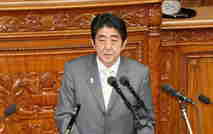 Source: kantei.go.jp
Source: kantei.go.jp In terms of foreign relations, Abe did not spring any surprises on his audience, noting the importance of the US-Japan alliance (while mentioning that his government would “expend every effort” to reduce the burden of the Futenma base on Okinawa), Japan’s ties with Southeast Asia (for new friends are needed further afield when dealing with a rising power next door – note that China was not mentioned once in the text of the speech, and neither was South Korea, Russia, or Taiwan for that matter), and the Abe cabinet’s resolve to “firmly defend Japan’s territory and airspace”. Considering Abe’s role in past negotiations over the return of abductees from North Korea, his resolve to use “dialogue and pressure” to bring North Korea to the negotiating table appeared to be little more than lip-service, devoid of any new initiatives and merely following a tried-and-not particularly-successful formula. This may account for the reason this issue was met with desultory applause by those parliamentarians assembled to hear the speech.
In all, it was a speech that left one with the impression that Abe was mouthing platitudes without a great deal of effort put into explaining “how” his cabinet was going to bring about this economic turnaround, social reformation, and diplomatic revival. If Abe is going to inspire others in the task of reform, he himself needs to lead by example, making those decisions will while politically painful at present will ultimately build the foundations for a more dynamic society. So far there’s been little evidence that this will happen.
As if to emphasise this point, Abe’s visit to Okinawa over the weekend merely reinforced the impression that his cabinet will maintain the status quo without any recourse to more novel or productive solutions. Take, for example, his announcement that his cabinet will endeavour to reduce the burden of the Futenma base on the Okinawan people. Successive cabinets have made that pledge, only one actually attempted to do something about it, and none have been able to make any headway with the Okinawan prefectural government on reaching an “understanding” in relation to the base. The reason is simple – the US-Japan defence treaty, and the need to maintain a credible deterrent to other powers in the region to deny them open access to the Pacific.
If Abe did aim to reduce the burden of the military’s footprint on Okinawa, a distribution of assets to other prefectures would be a start, however the experience of the Hatoyama cabinet has frightened off any subsequent attempts to force prefectures to accept larger deployments of US and Japanese military assets in their backyards. So again and again successive PMs and defence ministers have made the trek to Naha, met with Governor Nakaima, and walked away with no greater understanding between both sides than occurred at the previous meeting (E). What was that quote about the definition of insanity? (E)....
Speaking of every old being new again (bit of a non sequitur but bare with me), there was some hullabaloo on the weekend surrounding an act of contrition by one Minegishi Minami (J) of the all-girl pop group AKB48 who, to atone for her having spent the evening at the residence of a background dancer belonging to another all-male pop group, shaved all of her hair off and offered up an apology on Youtube (subsequently taken down as of Monday - J). Ordinarily this would not be news, other than the fact that Minegishi had violated the terms of her contract with her employer by having romantic relations while an active member of the group. To shave one’s head, however, struck many as being a tad “extreme”, for while Japan does have a tradition of women cutting their hair short to signify a change in their relationships with men, head shaving is an act reserved for nuns or particularly adventurous hair dressers.
That being said, the fact that Minegishi felt the need to shave her head to show the depth of her remorse for her actions speaks volumes about the culture of the group she belongs to, and the ridiculous demands made of the young women within it. While some could argue that she knew of the risks of holding a relationship, to expect a 20 year old engaged in the entertainment industry to act without recourse to her emotions betrays the ugly commercialism behind the group and the motives of its creators.
One does wonder whether Minegishi’s act has set a precedent, both in the entertainment world and the impressionable world of Japanese youth.
 RSS Feed
RSS Feed